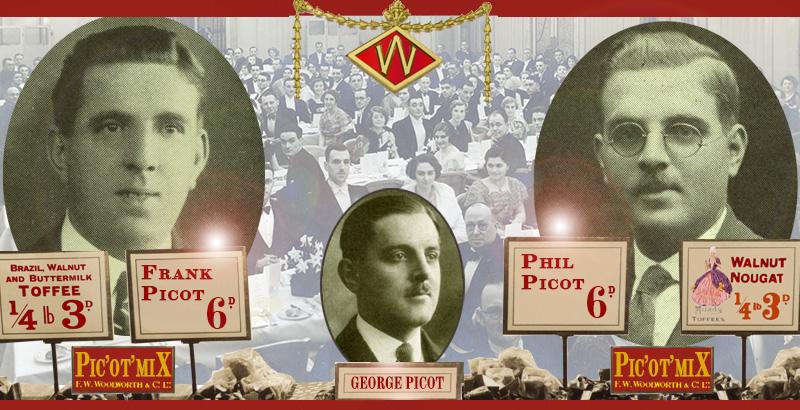The Woolworths Museum
Picot Mix
The amazing story of three Store Managers,
Frank, Phil and George Picot,
who were true wonders of Woolworth.
Don't be deceived. The three brothers may look quite similar, but
their management styles and careers were much more distinctive.
Introduction
In the late 1980s, shining after modernisation under new management, Woolworths staff took great pride in their stores. Many colleagues had very long, dedicated service, and corporate memory was remarkably strong. In many of the longest-established branches they had particularly fond memories of one Manager, who had entered their folklore as a kind of Patron Saint. They would share stories of "sir" as if he had recently left the store, when sometimes he had last unlocked the doors more than fifty years earlier. In two of the largest and best known outlets, Brixton, SW9, and Bognor Regis, West Sussex, their hero was called Mr Picot. Despite the rare name, they weren't the same man, but two brothers, Frank and Phil.
- Frank had taken 'Store 7' from a dingy, dusty, dark and delipidated building set back between Brixton's two railway bridges, with Southern Electric trains clattering past the windows of the upper salesfloor, to a newly-built, iconic store at the opposite end of the parade. It was bright, clean, spacious and thronged with shoppers from dawn to dusk. The art deco faience frontage unveiled in 1936 remains one of Brixton's most elegant buildings to this day. Yet after a stellar career that could have taken him to the very top had he wished it, he was cruelly dropped like a hot brick as a punishment because his staff liked him too much and he was believed to have "rocked the boat".
- Phil deftly steered '344 Bognor' through the traumas of World War II. Calm under fire, he proved tough and fearless while remaining kind and considerate. When the Luftwaffe sprayed a packed London Road with machine gun fire, 'the boss' donned a hard hat and shepherded everyone inside, sat them at his "Milk Cocktail Bar", and made each personn in turn a cup of hot, sweet tea to calm their shattered nerves. When the going got tough, "Mr. P." really got going! Yet after building a career on never giving offence, and treating everyone with respect, soon after his fiftieth birthday he was driven out of the store he loved and forced to commute 110 miles a day to manage a branch in Outer London. The official reason was that he had been in the same place for too long, but the truth was that he had asked a difficult question that his bosses were determined not to answer.
- George joined in 1920 after rehabilitation from an injury sustained in the Great War. He too rose rapidly to the helm of a flagship Central London store, before his wounds forced him to take a step back in 1930 and step aside in 1932. Eight years later in 1940 the Company pressed him into service again, keeping stores trading on the home front after their managers were called up. He remained in post until late 1946 when the last manager finally demobilized. Twice he had successfully steadied the ship, restored staff morale and boosted the service standard, deftly navigating the major changes that came as the Company dropped its upper price limit, providing a much-valued service to the local community. But ultimately his brother Frank's fate caused him to lose faith in Woolworth's and take a sedentary job elsewhere.
Background
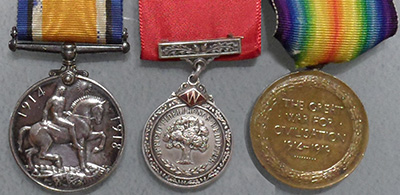 The 1901 Census for Tunbridge Wells in Kent enumerated a house full of Picots. The family had recently moved from their ancestral home in St Helier, capital of Jersey, Channel Islands. At the head of the household was Matthew J.F. Picot (35), a Sales Manager, and his wife Elizabeth (39, née Le Sueur), with five sons - John (12), Clement (9), Frank (7), George (3) and Philip (1), a daughter, Mary (6), and Matthew's mother also called Mary (70). They had one servant, Annie Lord (33).
The 1901 Census for Tunbridge Wells in Kent enumerated a house full of Picots. The family had recently moved from their ancestral home in St Helier, capital of Jersey, Channel Islands. At the head of the household was Matthew J.F. Picot (35), a Sales Manager, and his wife Elizabeth (39, née Le Sueur), with five sons - John (12), Clement (9), Frank (7), George (3) and Philip (1), a daughter, Mary (6), and Matthew's mother also called Mary (70). They had one servant, Annie Lord (33).
The four oldest boys all served during World War I as volunteers rather than conscripts. John swapped Master Boatbuilding in Southampton for the Army Ordnance Corps, while Clement forewent a prized job as a Cable Wire Operator in Clerkenwell, London for the Royal Navy. It seems John's choice of Regiment was to join his younger brother, Frank, who had enlisted on his seventeenth birthday in September 1910, and had risen to become a Sergeant. George Fauvel Picot had followed Frank's example, enlisting at the outbreak of War. He was assigned to the Royal Welsh Fusiliers (an infantry regiment founded in 1689 as the 'Welch Fuzziliers'). All four survived the long conflict; but by 11 November 1918 bore both mental and physical scars.
Phil turned eighteen shortly before the Armistice. Having faced the daily ordeal of waiting for news of four sons on the front line, and seen its toll, Matthew and Elizabeth would not countenance him joining up. Instead they evangelised a career in accountancy, or teaching like Mary, for their bespectacled youngest. Somehow, by God's grace, their brood was one of the lucky few to survive the conflict intact, despite every eligible person doing their bit at the first opportunity.
Two of the three soldiers - Frank and George - joined the rapidly expanding F.W. Woolworth Threepenny and Sixpenny Stores as 'Learners' (Management Trainees), and were soon followed by their youngest brother Philip. They proved to be the cream of the crop, and quickly rose to the top in-store. Meanwhile John and Clement returned as heroes to their careers in the boatyard and at the Telegraph Office.
Frank and Phil went on to serve in the High Street for the rest of their working lives, while his disability prompted George to take a behind-the-scenes job at Woolies for much of the Thirties before stepping up again through the World War. He took early retirement in 1947 after twenty-six years' service, opting for a less physically challenging role elsewhere. The Woolworths Museum is proud to honour the brothers, share their stories and set the record straight.
Please pick a career to view
Key: * = Opened a brand new store or re-opened the branch after it was extended
AGM = Associate General Manager (A second manager on 'special duties' in a large superstore)
PT Pro-Tem Manager, providing temporary cover when the regular manager was temporarily unavailable
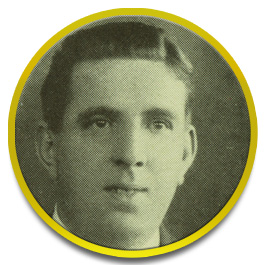
Frank Picot
- 71 Sutton (Learner) 1919
- 78 Streatham 1920
- 64 Tooting 1920
- 104 South Shields* 1921
- 34 Clapham Junction* 1922
- 35 Portsmouth* 1927
- 7 Brixton* 1932
- 74 Ealing Town 1938
- Deceased 1942
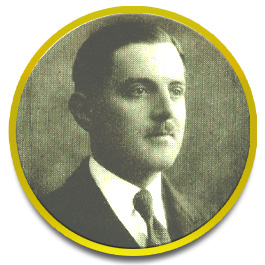
George Picot
- 7 Brixton (Learner) 1920
- 61 Stoke Newington 1922
- 151 Exeter*1923
- 173 High Holborn 1928
- 293 Upton Park 1930
- AGM 30 Edgware Rd 1932
- PT 707 Wst Norwood 1940
- PT 138 Gillingham 1942
- Resigned 1946
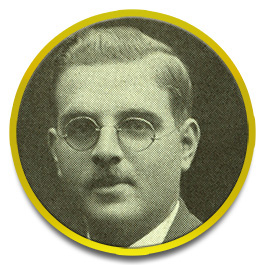
Phil Picot
- 7 Brixton (Learner) 1923
- 256 Strood* 1927
- 84 Poole 1927
- 203 Harrow Road 1929
- 298 Sittingbourne 1929
- 359 Winchester 1932
- 344 Bognor Regis 1937
- 334 Muswell Hill 1952
- Retired 1960
Press coverage of the strike at Woolworth's Brixton when the staff found out their Manager was being moved.
Download all the Picot Mix pages in a 142 page book format PDF (low resolution 9.5 megabytes)
Download all the Picot Mix pages in a 142 page book format PDF (high resolution 16 megabytes)
